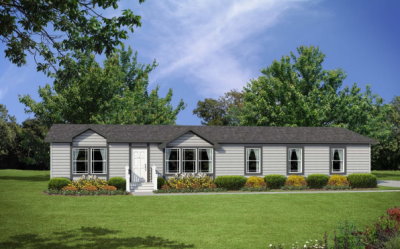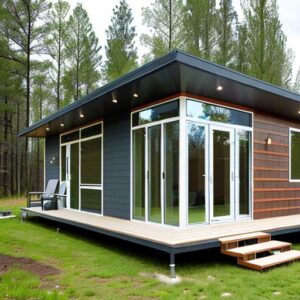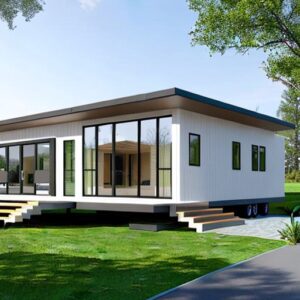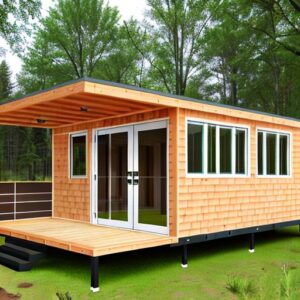Pros
- Less Turnover Time

One of the most notable benefits of building a prefabricated house instead of a site house is the reduced construction time. Assembling of the modular house takes place in a controlled environment in a factory, away from the site. This ensures that construction takes place throughout the projected time and this works by reducing the turnover time. While the assembling of a prefabricated house goes on at the factory, the construction of the basement foundation takes place simultaneously at the site. This in turn cuts off the turnover time by almost half. The estimated turnover time for building a prefabricated house is 2 months if everything else goes as planned.
- Environmental Friendliness
Building a site house usually involves a lot of movement due to site excavation and the movement of materials to the site. The heavy trucks carrying materials take a huge toll on the feeder roads to the site, while at the same time emitting tons of greenhouse gases into the atmosphere. What follows is climate change and its effects are felt when Mother Nature’s wrath descends on our future generations and us. When building a prefabricated house, there is minimal interruption of the environment around the site. This is because the assembling of the house is done in a controlled environment in a factory where less waste is produced. The waste produced is usually recycled in making other items and this reduces the amount of waste that finds its way into the landfills.
- Reduced Cost of Construction
The most important benefit to reap from a prefabricated house is the reduced cost of construction. The assembling of the house at the factory cuts off the cost of transporting building materials to the site. It also reduces the number of the construction workforce and this In turn reduces the cost of construction. Building a prefabricated house means you do not need some permits since some manufacturers take care of this because most construction is done at the factory.
- Quality is a Guarantee
The enclosure of the factory provides a perfect controlled environment for the manufacturer to work on your prefabricated house. This means that elements like winds, hot sun, and water do not interfere with your house before it is installed on your site. Even before the assembling begins, you are assigned to a prefab house expert who listens to your demands and this helps them bring your imaginations to life. They then present you with the many designs and sizes to choose from, something that does not happen with site homes.
Cons
- The Upfront Cost is Higher
Usually, with site homes, you can pay up to around 20% of the total cost and then finish paying the balance in installments later. However, with prefabricated houses, you might be required to pay the full cost and even if you are allowed some deposit, it is usually higher than that of site homes. This is quite an inconvenience that sometimes makes owning a prefabricated home a little challenging.
- Hassles of Utilities Hook Up
Securing a permit for building a prefabricated house a little challenging since they take longer to be approved. Also, you have to look for land that is even and leveled to allow for the installation of the modular home. At the same time, there have to be feeder roads to allow the trucks ferrying the modular homes access to the site. The main challenge comes in when there are no utilities available at the site; you have to arrange for this beforehand.
From the discussion above, it is evident that it is not always sunshine with prefabricated houses; they also come with their fair share of challenges. Fortunately, the few challenges can be thwarted with the proper arrangement and preparation. It is therefore fair to conclude that the benefits outweigh the disadvantages of building a prefabricated house, provided you have good land and the financial muscle to get started.



